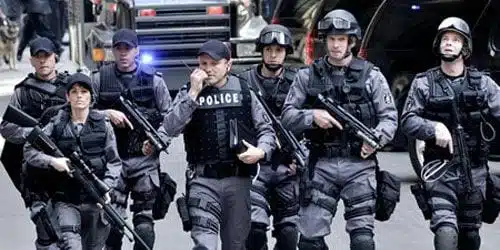
“You know why we’re all here?” asks Sgt. Gregory Parker (Enrico Colantoni). “It’s about helping you. Do you understand? Help. Understand?” Actually, no. The man he’s trying to reach does not understand. He’s not close to understanding. It’s not enough that he’s Croatian and apparently speaks no English, but he’s also got a big gun in his hand, held close to the head of a whimpering blond office worker wearing pink. Add to that that the camera tends to circle him from below, the yellowy sky is laced with time-lapsed clouds, and worst of all, the soundtrack is filled with an ominous undertone and Muslim adhan — ever the sign of big fat trouble in Western mass media.
Parker is no slouch. He knows his time is short, that his subject’s increasing panic can only lead to trouble, that his own calm and focus are crucial. As the leader of the Strategic Response Unit (SRU, modeled on Toronto’s SWAT-like Emergency Task Force), Parker’s been somewhere like this before. And as the star of Flashpoint, a scripted effort — by way of Canada, picked up for U.S. broadcast during the writers’ strike and premiering on CTV and CBS simultaneously on 11 July — Parker has his hands full too, mostly with clichés.
Aside from the adhan, he’s got the circling low-angled camera, the distraught doer-who-might-be-a-terrorist, and multiple SRU members racing to get into positions on rooftops and across streets. He also has that language barrier going on. He keeps his eye on the shooter while demanding translations through his headset: “Give me, uh, ‘We wanna help,'” “Give me, ‘Calm down!'” None of his versions of these phrases seems to help. The situation is dire. Check check check.
With the crisis thus established, Flashpoint cuts back in time to the beginning of this day, when one of Parker’s snipers, Ed Lane (Hugh Dillon), is doing his best to get out the door. Predictably, his wife Sophie (Janaya Stephens) is riding him for being over-committed to the job: “The world is not gonna end,” she remarks from her appointed place in the kitchen, “if you and your friends miss a few pushups.” He harrumphs, as he must, then heads outside to his buddy’s vehicle, the two of them offering a few bars of Gilbert & Sullivan to appease her: “When constabulary duty’s to be done, to be done, / A policeman’s lot is not a happy one, happy one.”
As Ed heads off toward the crisis to come, the show cuts to the very, very unhappy shooter, Goran (Xhemail Agaj). He’s riding a subway with his son Petar (Danijel Mandic), whom he embraces as they part ways. Head hanging, eyes dark, Goran is immediately typed as a problem, though he’s granted no motivation or English-language dialogue. Rather, he heads off to see his estranged wife (working as a janitor downtown), extracts from her a terrible price for rejecting him, and ends up with the hostage in his grip and surrounded by television cameras, civilians, and cops galore. Again, Flashpoint does what you expect: Ed and the other sniper, Jules (Amy Jo Johnson), set up on rooftops, monitors and cameras are deployed, and forensic psychologist Kate (Ona Grauer) make obvious observations (“I’m thinking, multiple stressors”). The music gets louder, the camera jerks about, the shooter looks increasingly “stressed.”
And then, the scene pivots. Suddenly, it’s not about the crisis per se, it’s not about possible terrorism or even about a crazed individual. Instead, it’s about aftermath. Specifically, aftermath for the ostensible heroes (a brief Homicide: Life on the Streets-like montage at the episode’s end, complete with sad pop song, offers a glimpse at the shooter’s son, bereft in the morgue). When the “hostage situation” ends violently, the poorly characterized Goran is essentially left behind on the sidewalk, while the team members undertake to deal with one another (competitors, buddies, urban warriors) and to square their moral sense with what they do for a living.
As the series thus begins to probe the emotional effects of split second decisions and causing traumatic violence, it does through assorted and refracted angles. Some of these begin from conventional places: Jules is plainly trying hard to be included in the boys’ club, while also feeling inclined to nurture. The shrink offers regular advice with unsurprising snark (“You’re not gonna have any sleepless nights, flashbacks, memory loss, time distortions; you’re not gonna feel alone, feel guilty, feel guilty about not feeling guilty. That’s what happens to other people. You’ll be fine”). And a new kid named Sam (David Paetkau) arrives just in time to disrupt established relationships and bring with him recent, harrowing military experience (indicated in his sad look at photos of erstwhile buddies in uniform).
However Flashpoint works through the distress and damage it lays out here, it gets points for beginning with the difficulty, not with the triumph. Now, if it can just figure a way beyond the scary perp clichés.
